These are the best e-commerce platforms for beginners to start selling online for free.
In this blog post, you will discover the 5 best e-commerce platforms for beginners that are user-friendly and free to start.
Wanting to start an online business can be costly for some. However, this reason should not stop anyone from achieving their dream of starting an online business.
Here I found these platforms that are user-friendly and budget-friendly.
My top five in this post are my favorites that I recommend to those wanting to start. I wish someone told me years ago that I could start an online business with a low budget and that I would not need to spend so much time setting up a store.
Table of Contents
*Disclosure: This post may contain affiliate links at no additional cost to you. I only recommend products I would use myself; all opinions expressed here are mine. In addition, I may earn a small commission.
What are the 5 Best E-Commerce Platforms for Beginners?

Here is a list you can take a look at and decide which one suits you for your business needs.
Big Cartel
Big Cartel has three amazing pricing plans for those who are budget-conscious. The free plan includes only five products, which is not a bad place to start.
You don’t want to start with a huge inventory and lose so much money because it is not selling. When you see your products are selling, you can upgrade your plan, as seen in the image below, it’s still affordable.
It’s a great platform for physical and digital products with affordable pricing and an easy, user-friendly setup.
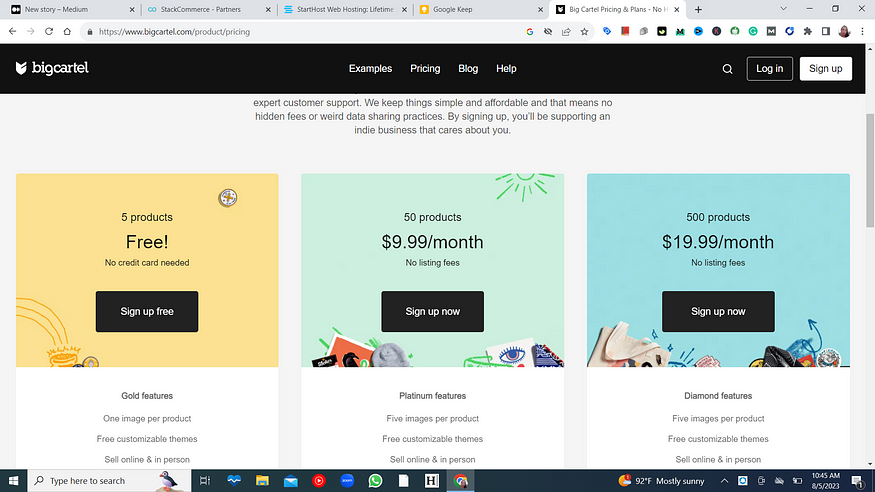
These are the pricing plans Big Cartel offers:
- Free: No credit card is needed! (Always)
- Up to 5 products
- 1 image per product
- Free, customizable themes
- Sell online and in person
- Real-time stats
- Use a custom domain
- Offer discounts and promotions.
- Product option group
- Sales tax autopilot
2. $9.99: Up to 50 Products (No listing fees)
- Five images per product
- Free, customizable themes
- Sell online and in person
- Real-time stats
- Use a custom domain
- Theme code settings
- Google Analytics
- Inventory tracking
- Offer discounts and promotions.
- Bulk editing
- Shipment tracking
- Product option groups
- Sales tax autopilot
3. $19.99 (Up to 500 Products) No listing fees
- Five images per product
- Free, customizable themes
- Sell online and in person
- Real-time stats
- Use custom domain
- Theme code setting
- Google Analytics
- Inventory tracking
- Offer discounts and run promotions
- Bulk editing
- Shipment tracking
- Product option groups
- Sale tax autopilot
As you can see, Big Cartel is a completely affordable platform to start on and upscale later on. Your e-commerce business doesn’t need to start on an expensive platform like BigCommerce or Shopify.
You can start using platforms such as Big Cartel with the free plan. Test the waters with this one and see if this is an option for you.
Ecwid
Like Big Cartel, Ecwid is an affordable platform for starting an e-commerce business. At Ecwid, you’re only allowed up to 5 products on the forever free plan. Also, there are no transaction fees. The only difference with Ecwid is that you can add more than one image per product.
Source: https://support.ecwid.com/hc/en-us
Product images let your customers know what your products look like. You can upload as many images per product, as you like. It is also possible to embed images (and videos) into product descriptions to provide even more details to your customers.

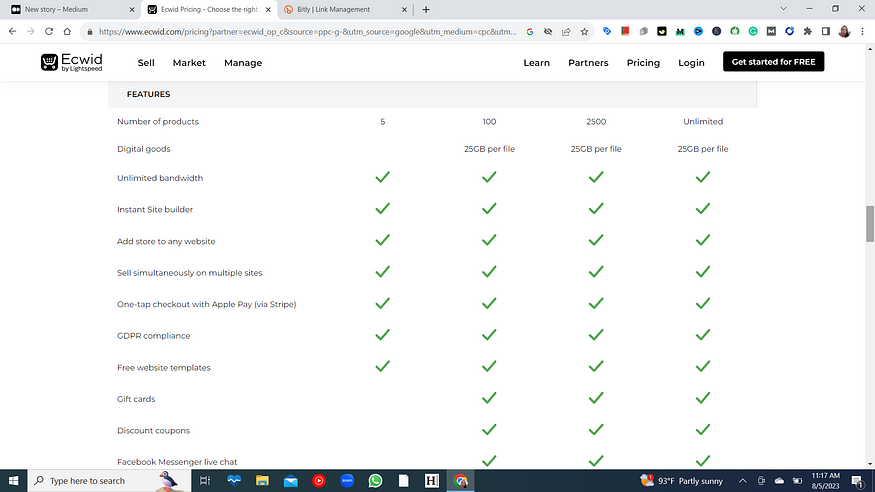
As you can see, you’re no longer limited by a lack of resources to start an e-commerce store.
I suggest trying just five products to sell and taking great photos of your products. You can find amazing products at low prices on websites such as Alibaba, or you can search on Google for “local wholesalers” in your area to avoid any expensive overseas shipping costs.
I also advise buying at a low price and selling it for a bit more to cover any expenses from purchasing the product.
Use the Canva software to remove any background and edit your product images. The more eye-catching your photos are, the more likely your potential customers will be willing to purchase your product.
You can also use Canva’s Magic Write AI tool to easily write product descriptions.
Etsy
Etsy is a great place to start. You can start with 40 free listings with my link and start selling immediately. With Etsy, you can add up to 10 photos of your product.
You can sell physical, hand-made, and digital products. You can do POD (print-on-demand) with Printify, Gelato, or Printful.
With Etsy, you will need to learn some SEO skills to know how to rank, what niche, what products, and what exactly people want to buy right now.
The downside of Etsy is the listing fee charges you still get even if you have not sold anything.

Payhip
Payhip is another great choice for selling physical products online without spending too much money every single month on subscription plans. Payhip differs from Ecwid, Big Cartel, and Etsy because it is free forever and you can add unlimited products.
The free plan also includes all features and unlimited revenue. The only fees are the transaction fees at 5%. No credit card is required to start.
Features Included:


Koji (Update: As of 02/01/2024, Koji is no longer available)
The Koji app is an in-bio link app similar to Linktree, Beacon, or Bitly. This works great for all your social media platforms, including TikTok, if you can add a link to your profile.
With Koji, the options to sell physical products are limited. With Koji, you will have more options to sell downloads than physical products. If you’re an Amazon affiliate or influencer, then Koji can be an amazing app for your links. See the two images below.
Disclaimer: Koji has been acquired by LinkTree. As of 02/01/2024, the Koji app is no longer available.
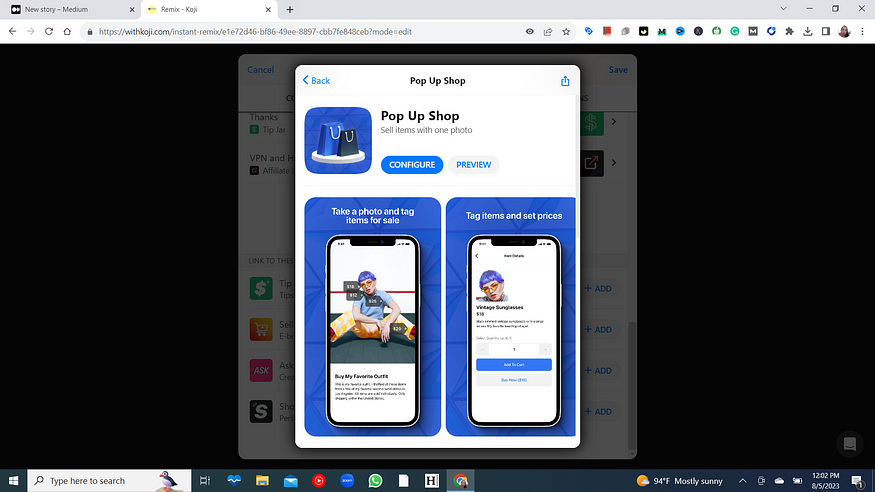
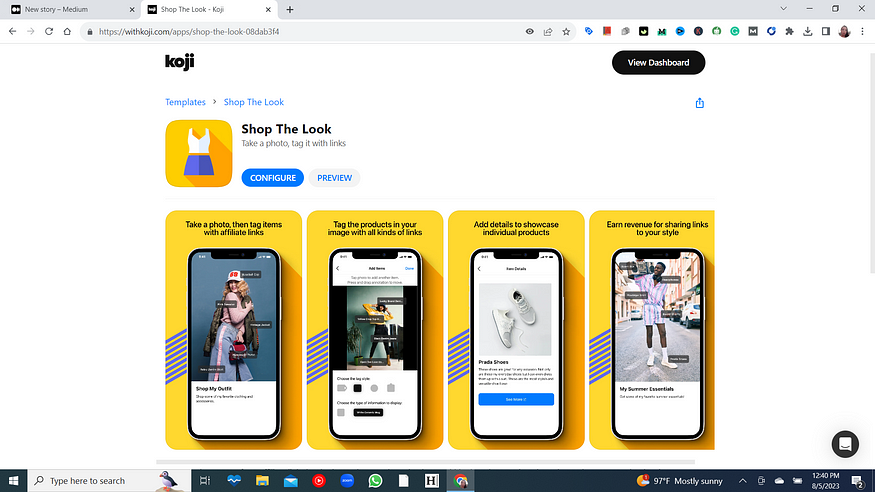
The Koji template “Sell Physical Products” only allows one product to be sold. You can add more than one image but only sell one product.
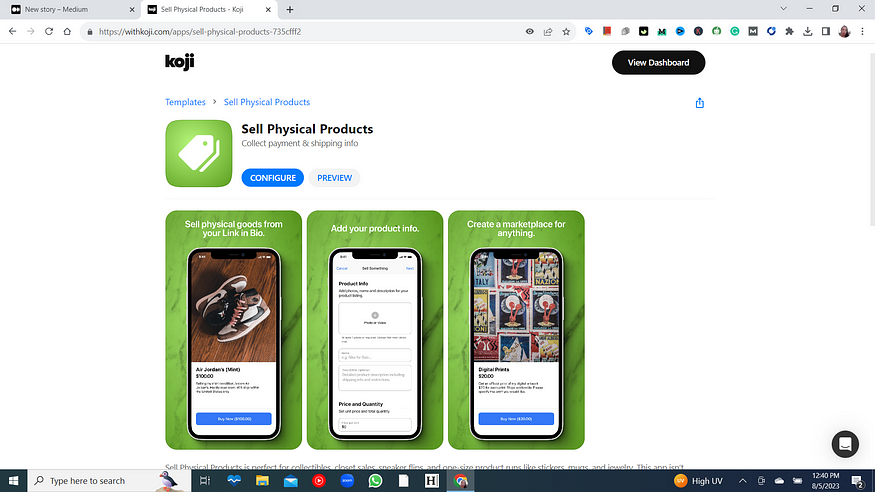
My Preferred Option:
My main choice would be to go with Payhip due to all the amazing features added to the free plan. The free plan includes unlimited products and unlimited revenue. You only pay for the transaction fees at 5%.
Of course, this doesn’t mean you must go crazy on your first try to buy a lot of bulk merchandise. First, you must test the waters and do some research. You must know and see what is selling.
Then you go buy great products you can purchase on your budget and resell them at a good price to make a profit.
My second best option is Ecwid. You can upload as many images as you want for each of your five products. It’s free for physical products, but you can upgrade to the Venture plan if you want to sell digital products.
FAQ
- What are e-commerce platforms, and why do beginners need them?
E-commerce platforms are software solutions that enable individuals and businesses to create online stores and sell products or services online. They provide essential features like product listing, payment processing, inventory management, and more. Beginners need these platforms because they offer user-friendly interfaces, pre-built templates, and easy setups, making it simpler for newcomers to enter the world of online selling without extensive technical knowledge.
2. What makes a good e-commerce platform for beginners?
A good e-commerce platform for beginners should have a user-friendly interface, an easy setup process, responsive customer support, and a variety of pre-built templates to choose from. It should also offer essential features like secure payment gateways, inventory management, and SEO tools. Moreover, beginners often prefer free plans or affordable pricing options to minimize initial costs.
3. What are the top five e-commerce platforms for beginners that are also free?
The top five e-commerce platforms for beginners that are free include:
a. Ecwid
b. Etsy
c. Koji
d. Payhip
e. Big Cartel
4. What is Ecwid, and why is it a good choice for beginners?
Ecwid allows you to transform your website into a fully functional e-commerce store. It’s an excellent choice for beginners because it’s easy to set up, integrates seamlessly with sites, and offers various features to enhance your store’s functionality.
5. Can you explain Koji and why it suits beginners?
The Koji app allows you to sell products on an existing website or social media channels. It’s an excellent option for beginners who want to start selling without committing to a full-fledged online store. With the Koji app, you can easily add the link to your site or social media posts, making it simple to get started.
6. What features make Ecwid a beginner-friendly e-commerce platform?
Ecwid is a popular website builder that offers a dedicated e-commerce feature. It’s beginner-friendly due to its drag-and-drop interface, allowing you to build your online store effortlessly. With customizable templates, a range of payment options, and easy-to-use product management, Ecwid makes creating and managing their online stores convenient for beginners.
7. Why should beginners consider PayHip for their e-commerce needs?
Payhip is a user-friendly e-commerce platform that integrates seamlessly with Payhip’s payment processing services. It’s ideal for beginners because it offers a straightforward setup process, mobile-responsive templates, and a host of useful features like real-time shipping quotes and order management.
8. What sets Big Cartel’s free plan apart from other e-commerce platforms?
Big Cartel’s free plan is designed specifically for artists and creators. It allows beginners to list and sell up to five products without recurring monthly charges. This simplicity makes it an attractive choice for artists and small business owners who are just starting and want to keep initial costs low.
9. Is there any limit on the number of products that can be listed on these free platforms?
Yes, some of these free e-commerce platforms limit your list of products. For instance, Big Cartel’s free plan allows up to five products, while Shopify Lite lets you sell unlimited products but only through external channels like your existing website or social media. Be sure to check each platform’s specific limitations before making a choice.
10. Can I switch to a different platform later if my business grows?
Yes, most e-commerce platforms offer migration options that allow you to move your store to a different platform as your business grows. Remember that the process may vary depending on the platforms involved, so it’s advisable to research and plan ahead if you anticipate significant growth in the future.
Conclusion
Selling online doesn’t have to be expensive anymore. With a limited budget, you can find options for platforms that offer free plans with amazing features for your e-commerce store.
You no longer have to get stuck with certain business models that require tons of capital and only do Amazon FBA or dropshipping.







